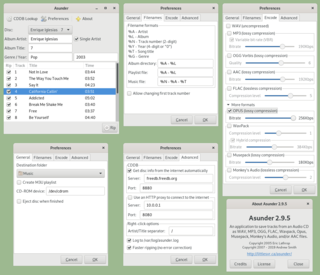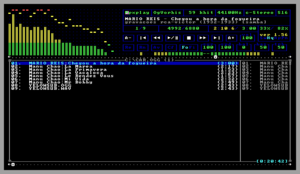An audio file format is a file format for storing digital audio data on a computer system. The bit layout of the audio data is called the audio coding format and can be uncompressed, or compressed to reduce the file size, often using lossy compression. The data can be a raw bitstream in an audio coding format, but it is usually embedded in a container format or an audio data format with defined storage layer.

Ogg is a free, open container format maintained by the Xiph.Org Foundation. The creators of the Ogg format state that it is unrestricted by software patents and is designed to provide for efficient streaming and manipulation of high-quality digital multimedia. Its name is derived from "ogging", jargon from the computer game Netrek.
Vorbis is a free and open-source software project headed by the Xiph.Org Foundation. The project produces an audio coding format and software reference encoder/decoder (codec) for lossy audio compression. Vorbis is most commonly used in conjunction with the Ogg container format and it is therefore often referred to as Ogg Vorbis.
Windows Media Audio (WMA) is a series of audio codecs and their corresponding audio coding formats developed by Microsoft. It is a proprietary technology that forms part of the Windows Media framework. WMA consists of four distinct codecs. The original WMA codec, known simply as WMA, was conceived as a competitor to the popular MP3 and RealAudio codecs. WMA Pro, a newer and more advanced codec, supports multichannel and high resolution audio. A lossless codec, WMA Lossless, compresses audio data without loss of audio fidelity. WMA Voice, targeted at voice content, applies compression using a range of low bit rates. Microsoft has also developed a digital container format called Advanced Systems Format to store audio encoded by WMA.
Monkey's Audio is an algorithm and file format for lossless audio data compression. Lossless data compression does not discard data during the process of encoding, unlike lossy compression methods such as AAC, MP3, Vorbis, and Opus. Therefore, it may be decompressed to a file that is identical to the source material.
The Apple Lossless Audio Codec (ALAC), also known as Apple Lossless, or Apple Lossless Encoder (ALE), is an audio coding format, and its reference audio codec implementation, developed by Apple Inc. for lossless data compression of digital music. After initially keeping it proprietary from its inception in 2004, in late 2011 Apple made the codec available open source and royalty-free. Traditionally, Apple has referred to the codec as Apple Lossless, though more recently it has begun to use the abbreviated term ALAC when referring to the codec.
Music Player Daemon (MPD) is a free and open music player server. It plays audio files, organizes playlists and maintains a music database. In order to interact with it, a client program is needed. The MPD distribution includes mpc, a simple command line client.
Roxio Creator is a proprietary optical disc authoring program produced by Roxio. The software, originally released as Easy Media Creator, represents an updated version of the previous Easy CD Creator series.
VDMSound was an open-source emulator of legacy sound card devices, designed to allow video games and other applications written for MS-DOS to run on the Microsoft Windows NT/2000/XP/95/98/Me operating systems. Its author is Vlad Romascanu.

Music On Console (MOC) is an ncurses-based console audio player for Linux/UNIX. It was originally written by Damian Pietras, and is currently maintained by John Fitzgerald. It is designed to be powerful and easy to use, with an interface inspired by the Midnight Commander console file manager. The default interface layout comprises a file list in the left pane with the playlist on the right. It is configurable with customizable key bindings, color schemes and interface layouts. MOC comes with several themes defined in text files, which can be modified to create new layouts. It supports ALSA, OSS or JACK outputs.

Audacious is a free and open-source audio player software with a focus on low resource use, high audio quality, and support for a wide range of audio formats. It is designed primarily for use on POSIX-compatible Unix-like operating systems, with limited support for Microsoft Windows. Audacious is the default audio player in Lubuntu and Ubuntu Studio.
This article describes audio APIs and components in Microsoft Windows which are now obsolete or deprecated.

The SanDisk Sansa is a line of 2- to 32-gigabyte flash memory-based portable media players produced by SanDisk.

Asunder is a free and open-source graphical (GTK2) CD-ripping program for Unix-like systems. It doesn't have dependencies to the GNOME libraries or libraries of other desktop environments. It functions as a front-end for cdparanoia.

aTunes is a free and open source audio player with MPlayer as its playback engine. aTunes supports MP3, Ogg Vorbis, FLAC and other formats. aTunes allows users to edit tags, organize music and rip audio CDs easily.

The Sansa Fuze is a portable media player developed by SanDisk and released on March 8, 2008. The Fuze is available in three different Flash memory capacities: 2 GB, 4 GB, and 8 GB and comes in six different colors: black, blue, pink, red, silver, and white. Storage is expandable via a microSDHC slot with capacity up to 32 GB, and unofficially to 64 GB or more via FAT32 formatted SDXC cards. All models have a 1.9 inch TFT LCD display with a resolution of 220 by 176 pixels and a built-in monaural microphone and FM tuner; recordings of the latter two are saved as PCM WAV files.

Simplified Universal Player Encoder & Recorder (SUPER) is a closed-source adware front end for open-source software video players and encoders provided by the FFmpeg, MEncoder, MPlayer, x264, ffmpeg2theora, musepack, Monkey's Audio, True Audio, WavPack, libavcodec, and the Theora/Vorbis RealProducer plugIn projects. It was first released in 2005. SUPER provides a graphical user interface to these back-end programs, which use a command-line interface.

AIMP is a freeware audio player for Windows and Android, originally developed by Russian developer Artem Izmaylov. The first version of AIMP, dubbed "AIMP Classic", was released on August 8, 2006. AIMP was initially based on the BASS audio library. Version 3 added a new audio engine and full support for ReplayGain, and revamped the music library interface transparency effects.

An audio coding format is a content representation format for storage or transmission of digital audio. Examples of audio coding formats include MP3, AAC, Vorbis, FLAC, and Opus. A specific software or hardware implementation capable of audio compression and decompression to/from a specific audio coding format is called an audio codec; an example of an audio codec is LAME, which is one of several different codecs which implements encoding and decoding audio in the MP3 audio coding format in software.

DeaDBeeF is an audio player software available for Linux, Android and other Unix-like operating systems. DeaDBeeF is free and open-source software, except on Android.










